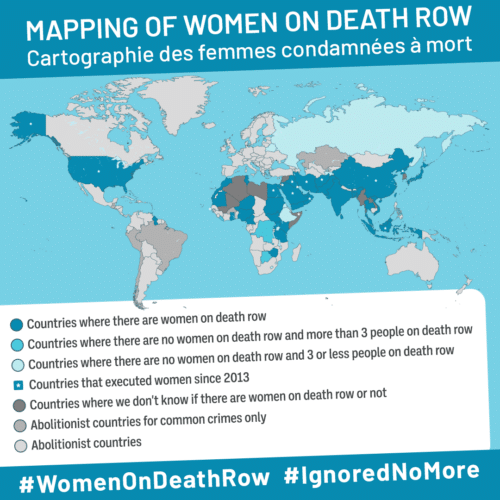

For the World Coalition Against the Death Penalty, the fight for the abolition of the death penalty must be based on an intersectional and gender-based approach. Since 2021, on World Day Against the Death Penalty, dedicated to the invisible reality of women on death row, the World Coalition has been proactively engaged in making visible the intersectional discrimination that women and LGBTQIA+ people face in the judicial process leading to the death penalty. From 2022 to 2025, the World Coalition is working on these issues primarily in Indonesia, Iran, Japan, Jordan, Kenya, Malaysia, Nigeria, Tanzania, Sri Lanka, Uganda and the United States.

Although women currently make up less than 5% of the global death row population, analysis of their profiles, backgrounds, and crimes for which they were sentenced to death deserves particular attention as it reveals the significant existence of gender biases in capital punishment proceedings. Women are exposed to intersectional discrimination throughout the judicial process leading to the death penalty as well as once on death row. The 2018 Cornell Center on the Death Penalty Worldwide report, the first comprehensive report on the subject, shows that a large majority of women on death row are from ethnic and racial minorities, non-literate, have intellectual, mental and/or psychosocial disabilities, and have experienced gender-based violence. In some regions, such as the Gulf States and Southeast Asia, most women on death row are migrant. The weight of gender discrimination is also reflected in the judicial process. Gender bias is present at the investigation stage, where law enforcement agencies display gender bias; at the trial stage, where many women do not have access to a fair trial due to lack of economic resources; and at the sentencing stage, where gender-related antecedents and circumstances of the crime, such as a history of gender-based violence, are not considered. Once in prison, women’s gender-specific needs, including sexual and reproductive health, medical and mental health care, protection from gender-based and sexual violence, and substance use harm reduction services, are not addressed. « A human rights-based approach to capital punishment cannot be complete without a gender component » Agnès Callamard, UN Special Rapporteur on extrajudicial, summary or arbitrary executions, 2018
LGBTQIA+ individuals 1 are also exposed to discrimination in the application of the death penalty. Sexual minorities are first directly stigmatized by criminal laws. 11 states worldwide (Afghanistan, Saudi Arabia, United Arab Emirates, Iran, Mauritania, Qatar, Nigeria, Pakistan, Somalia, Yemen, and Brunei) apply the death penalty for consensual same-sex sexual activity. In many countries, other morality-based offenses, such as « cross-dressing » and « offenses against public morals » are grounds for criminal prosecution that can lead to death sentences. Once on death row, gender and sexual minorities are particularly vulnerable to abuse and mistreatment. The World Coalition believes in the importance of a gender analysis of capital punishment to raise awareness of the inhumane and discriminatory nature of the death penalty and to advocate for its total abolition. 1 The World Coalition Against the Death Penalty chooses to use the acronym LGBTIQIA+ in order to use the most comprehensive and inclusive “umbrella” term. It is important to note that these terms and acronyms are neither universally accepted nor uniformly used.
The integration of a gender perspective on the death penalty is one of the commitments of the World Coalition Against the Death Penalty. With its members, the World Coalition implements actions to strengthen the protection of women and gender and sexual minorities facing the death penalty. The World Coalition is committed to making visible the gender and intersectional discrimination at work in the death penalty process. From 2022 to 2025, the World Coalition, along with The Advocates for Human right and the Cornell Center on the Death Penalty Worldwide are focusing their “gender and the death penalty” efforts in the following countries: United States, Indonesia, Iran, Japan, Jordan, Kenya, Malaysia, Nigeria, Tanzania, Sri Lanka, Uganda.
The World Coalition Against the Death Penalty believes it is important to strengthen the abolitionist movement’s ties with women’s rights and gender and sexual minority organizations. To this end, the World Coalition invites these organizations to join the abolitionist movement and to collaborate in the development of joint events and tools.
The World Coalition Against the Death Penalty supports the coordination of gender-sensitive international abolitionist advocacy. Particular attention is paid to the systematic integration of gender issues in the advocacy carried out with all human rights mechanisms as well as in the implementation of specific advocacy with specialized mechanisms on women’s rights such as the Committee on the Elimination of Discrimination against Women.